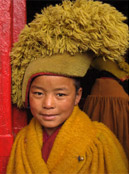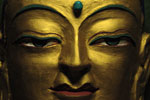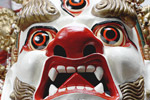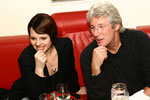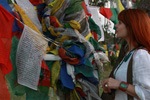Religion in Storm or Storm in Religion
The Tibetan Prime Minister Sikyong Dr. Lobsang Sangay,
Sikyong’s talk on “Religion in Storm or Storm in Religion”
at 5th Indian Student Parliament on January 12, 2015 Monday 9:0 a.m.
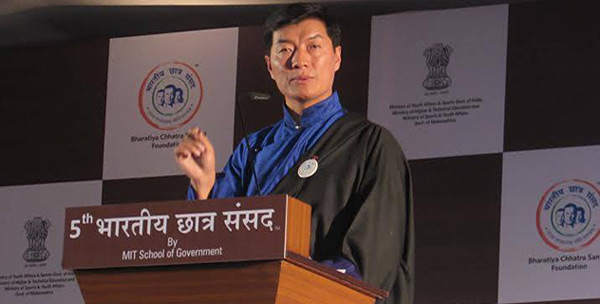
It’s a great honor and privilege for me to be here at the 5th Indian Student Parliament. I’d like to thank Vishvanath Karad jee and Rahul Karad jee for inviting me here and all organizers and participants. Hearty congratulations on behalf of the Tibetan people.
Honestly, I was very honored by the invitation, but perplexed by the topic - “Storm in Religion or Religion in Storm”. It’s not my cup of tea. As you can see I am a lay person and my background is law, so what do I know about religion? Week ago, when I looked at the topic, I said: Any other topic would be good except for religion. And I thought maybe I should talk about the movie “PK”. You all watched this movie. Then I realized that in this movie “PK” there is a concept of wrong number, so I thought that the organizers of this meeting dialed a wrong number when they invited me to speak on storm in religion. (laugh).
And today as I was speaking with the holly men from Christianity, from Islam, from Hindu religion, I was feeling some doubts whether I am committing sin sitting with holly people whom I am getting blessed sitting with holly people. Then I told to myself: “Perhaps the invitation came to me because I am a Tibetan who is setting refuge in India but I am from the land of Tibet, a land of Lake Manasarovar, a land of Mount Kailash, a land which gives refuge to Lord Shiva”. So this morning I sent an email to Lord Shiva asking forgiveness for committing all the sins that I’ll commit today and don’t send me to hell. But then I think as a feeling I have a message from Lord Shiva and now I am here on the land of Maharaj Shivaji.
Nonetheless the topic is very serious - “Storm in Religion or Religion in Storm”. If you look at the violence in Paris to Peshavar, from Ottawa to Australia, from London to Mumbai. Violence is everywhere. Is religion to be blamed or is religion blamed. Perhaps, Samuel Huntington, the author of “The Clash of Civilizations” would say: “All these violence across the world are indications that there are clashes of civilization between Christian western world and Islamic arab world.
Perhaps, Karl Marx should blame religion, because we all know his view on religion.He says: “Religion is the sigh of the oppressed creature, the heart of a heartless world, and the soul of soulless conditions. Religion is the opium of the people.” Having said that, there is another German philosopher by the name of Max Weber, who criticized Marx’s view and said that Karl Marx’s theory of linear progression of historical materialism is not a full truth, it is subjective and cultural and spiritual element of human life. And he did use religion with a spiritual idea to institutions, to individuals because a spiritual idea once is institutionalized, it takes a form of masjids, mandirs, monasteries with individuals involving in it are priests, pandits, preachers, mullas and monks. A spiritual idea itself is good, it is full of love, compassion, non-violence and peace. When it’s institutionalized into masjids, mandirs and monasteries, and individuals, pandits, priests, preachers, mullas and monks are not to be blamed, they all are harmless.
But a problem arises when religion is interpreted. So from all points of view - the spiritual idea is good. Institution is good. Individuals are also good. But its interpretation - it is where complexity happens. Rabindranath Tagore said: “When a symbol or spiritual idea becomes rigidly elaborate in its construction, it supplants the idea which it should support”. So when spiritual ideas are rigidly or dogmatically interpreted, it destroys the very basis which is supposed to support.
Rather what we need is liberal interpretation of religion and I bring you the words of Makhatma Gandi who said: “Like the bee gathering honey from different flowers, the wise person accepts an essence of the different scriptures and sees only the good in all religions”. That should be the interpretation of religion.
Let’s make a distinction between religion, religiosity and religionism. Religion is all good, it is all about love, compassion and peace. But when religion moves to religiosity, moves to community, it creates the separation – I become Buddhist community, you become Hindu community, they become Muslim community, they become Christian community and our identity and dignity are associated with that – religiosity of the community, then separation and distinctiveness and differences happen. Then it becomes more complex and problematic.
But the worse is when religiosity or religion turns to religionism, when religion is reduced to ideology, when a spiritual message of peace is reduce to ideology, you tried to impose ideology on different communities, and then it becomes much more complex. Then communalism and fundamentalism come above.
And there are many examples when religion turns to religiosity - it becomes complex and when religion turns to religionism - it becomes very complicated and conflicts. And we see many examples of Buddhist persecution of Rohingya Muslims in Myanmar, Buddhists persecuting Christians and Muslims in Southern Ireland and Buddhists are again persecuting people in different communities in Sri-Lanka. We have plenty of examples from ISIS of persecuting of different communities in Syria and Iran, Boko Haram in African countries and we have in recent times the troubles in Afghanistan and Iraq.
You can clearly see when you try to impose ideology on others, it becomes much more complicated. So the recent violence in Moradabad and Mustafa Nagar in Uttar Pradesh is also an element of communalism and fundamentalism within India. Even in Christianity, “The Army of the Lord” in Africa. In Northern Ireland Catholics and Protestants fought against each other in the name of the same God. We can clearly see when religion becomes religionism, then it becomes problematic.
But I’d like to put forth before you that religion itself is not to be blamed, religion is all good. But it becomes problematic … (here I again bring you another eye). Religion is all inclusive but we, people, make it exclusive, then religion becomes expensive, then it becomes exploitative and sometimes explosive.
Religion is all inclusive because Jesus Christ says: “Love Thy Neighbor. We all are children of the God”. Hinduism says: “Vasudhaiva Kutumbakam”, the world is one family. Islam says: “Love for humanity what you love for yourself”. And Buddhism is for all sentient beings not just for human beings but for forests, rivers, animals, galaxy and cosmology – it’s for all sentient beings.
And today we are celebrating the birthday of Vivekananda. Vivekananda sees God in everything. And we know the famous story of Guru Nanak. He visiting Mecca and at night when he fell asleep his feet turned to the shrine Kaaba; the guardsman came and told him to move his feet away from Kaaba, and he said: “Please, point my feet any direction where is no God. God is everywhere, God is omnipresent.
And in the true sense I’d like to submit and take pride that His Holiness the Dalai Lama is one of all of us. He initiates and participates in dialogue with all traditions. He visits maths, mandirs, synagogues, gurdwars everywhere. And recently he held a conference in Delhi bringing all nine traditions in India under one roof. That was a great achievement.
Now a problem is that inclusive religion becomes exclusive because we form Hindu community, Muslim community, Christian community, Sikh community. Not just exclusive, then we take pride associating with our guru and excess to guru becomes very expensive. Then we patternized our own guru and make him or her sit on a higher thronethan others. Then when it becomes expensive, it becomes exploitative and in such case we are to be blamed. And when it becomes explosive in the name of Holly War, in the name of Jihads, then religion becomes storm.
This is what we all need to fight against. Having said that, India and the whole world tried to devise a concept to deal with this exclusive, exploitative and expensive abuses. If we are speaking on secularism, there is Anglo-Franco definition of secularism followed by the western world, particularly America. America constitutionally and institutionally is a secular country but also it is the most religious country. Now, there is Marxists’ and Maoists’ definition of secularism which recognizes religion as opium of the masses and to destroy religion. That’s why Mao’s China tried to destroy religion in Tibet. 98% of monasteries and nunneries in Tibet were destroyed, monks and nuns were disrobed. But after the cultural revolution when Tibetans got first opportunity, what they did - they did rebuilt the monasteries and revived Buddhism in Tibet.
Now, there is third concept of secularism which is Gandhian, Indian definition of secularism which treats all religions equally. This is the right definition of secularism because India is a country where all nine traditions coexist. Not only coexist, four traditions originated in India - Hinduism, Buddhism, Jainism and Sikhism. This is the contribution of India to the whole world and unity in diversity of India is the beauty of India, the strength of India, the pride of India.
If Gods are to be blamed, if Gods are the problem, India has three to thirty crores of Gods and Goddesses. We will be in a big mess, we can’t let these Gods and Goddesses be the problem, we have to make them the solutions, so we have thirty crores solutions in India where nine traditions coexist.
Many people say that the 21th century should be the century of peace. Peace cannot come from violence because there is one data - since 9/11, since the campaign against terror there are more violence in the whole world, there are more terrorists and terror acts in the present world since 9/11. In fact, since 9/11 there are fivefold increase in terror acts all over the world. For example, in 2000 there were 3000 terror acts, in 2012 it increased to 11 000 and in 2013 it increased to almost 18 000 terror acts in the whole world. So violence against violence is not a solution because violence begins violence. Peace against violence is a solution. Unity in diversity is a solution.
Many experts say that the 21st century will be the century of Asia. And there is an Indian model and there is a Chinese model. We all read about China there is an economic boom, but what is not read is that there is a spiritual boom in China. There are 300-400 million Buddhists and China happens to be the largest Buddhist country in the whole world. And Buddhism originated in India, Buddhism was exported to China and China is the largest Buddhist country in the whole world. Nonetheless China’s model for Asia and for the world is development without democracy and India’s model is development with democracy and, what is more important, with spirituality. This is an ideal model because if peace is what we want, spirituality is what we should focus on. In this sense Samuel Huntington was right because there is clash of civilization only in terms of religionism, but not religion.
Karl Marx was right when he was talking about exploitive nature of religiosity but religion is not a problem. Religion is all about peace, love and compassion. Religion is the solution.
And let me conclude by saying I receive an email from Lord Shiva and He says: Religion is not the storm, it is a big calm before the storm and a big calm after the storm.
Jay Bharat! Jay Tibet! Jay Jagat!
Questions and Answers Session
Girl: When we are in India, we consider it as one India and one people. But why we are discriminated on the basis of religion by civil laws. I mean we have different laws for every religion. Why is it so?
Dr. Lobsang Sangay: I think, as I share with you, all religions are exclusive, all religions are inclusive and all religions mean love, peace and compassion. But as far as the origin of Indian constitution is concerned, and different laws for Hindu Marriage Act and others, it is just originated with differences within India. So there was a compromise made on the basis of the different traditions, this is a compromise and this is where India is at present but obviously as there is more equality and equal treatment of all by the government and by the agencies, we should move to one constitution and one law.
Having said that, at the moment because of past history, fear of discrimination and echo of discrimination in the name of religion these laws, these specific laws were promulgated and it is here to stay for some time, but definitely once India reaches the land of equality and treatment of all as same Indian citizens then I think these laws will make way for one law and one constitution.
![]()
![]()
![]()
![]()
